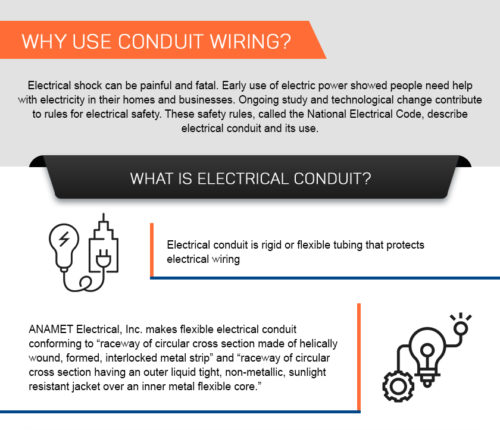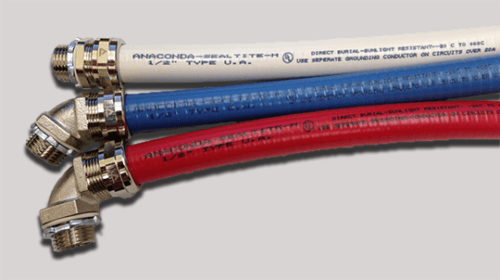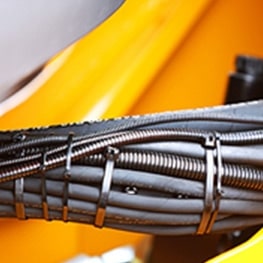Why are engineers switching to certain types of conduit?
Leave a CommentEngineers focus on delivery of effective design solutions within a budget and schedule. While simple electrical jobs cost only a few hundred dollars, larger installations may be more expensive due to the specific demands, needs or harsh operating conditions where electrical supply must be sustained and protected. National Electrical Code (NEC) changes and new products […]
How Deep Does Electrical Conduit Go?
Leave a CommentHave you ever wondered how deep an electrical conduit needs to be buried? Or perhaps you’re undertaking a landscaping or construction project and need to know how deep to bury electrical conduit. For safe electrical installation, these are crucial questions. We will provide guidance on how deep electrical conduits must be buried, based on various […]
What Are Different Types of Flexible Electrical Conduit?
Leave a CommentDifferent Types of Flexible Electrical Conduit Flexible conduit is described as a raceway for electrical conductors or wiring. Material, assembly and use are described in the NEC. Here are the most common types of flexible electrical conduit. 1. Flexible Metal Conduit (FMC) This type of electrical conduit is lightweight, durable and easy to install. This […]
Why Use Flexible Conduit Fittings?
Leave a CommentWhat Are Flexible Conduit Fittings? Flexible conduit fittings connect conduit to fixtures, machines or junction boxes, providing routing options while protecting wiring. Fittings must meet (Trade) size standards and have quality screw threads, allowing secure connections in confined spaces. Fittings offer a reliable transition between conduit sections, junction boxes or electrical devices. Fittings ensure […]
WHAT ARE ANACONDA SEALTITE® ELECTRICAL CONDUIT ENVIRONMENTAL BENEFITS?
Leave a CommentArchitects, engineers, and construction (AEC) professionals help resolve environmental challenges. Ongoing research and development in building materials and methods promote environmental safety. This is done by informed selection and installation of sustainable materials – like electrical products made from environmentally safe or non-toxic materials. Conduit and fittings that don’t contain harmful and dangerous substances support […]

Health Benefits in Electrical Conduit for the AEC
Leave a CommentIf you work in the AEC (Architect, Engineer, Construction) community, chances are you’re familiar with electrical conduit and its role in construction safety and system installation. However, do you know what these cable protection methods can do to your health? Plastics and metals can be toxic, posing health risks for those constantly exposed to them. […]
What is a Conduit System?
Leave a CommentIn a building being constructed, you may see a web of wiring and flexible electrical conduit. Electrical conduit provides electrical service and ensures people and the property are safe from accidental exposure to electricity. A conduit system is electrical conduit and fittings forming an armored shell, connecting and protecting wiring. The conduit and fittings are […]

Why Use Electrical Conduit?
Leave a CommentClick to Expand Why use conduit? Electrical shock is painful and can be injurious. Electrical conduit prevents contact with wiring and possible injury. What is electrical conduit? Electrical conduit is rigid or flexible tubing that protects electrical wiring. ANAMET Electrical, Inc. makes flexible electrical conduit conforming to “raceway of circular cross section made of helically […]

A Guide to Flexible Conduit Fitting Parts
Leave a CommentIn order to effectively protect electrical wiring, both a flexible conduit and a liquid-tight seal are necessary. Flexible Conduit is a tube used to route and protect wires and cables. It is typically made of metal or plastic. A Liquid tight seal is a special type of fitting that is used to create a watertight […]

Metallic vs Non-Metallic Flexible Conduits
Leave a CommentFlexible conduit is pipe or tubing used to protect and route electrical wiring in a structure. They can be various materials, including metal or plastic. There are two main types of conduit: metallic and non-metallic. Each has advantages and disadvantages to consider while choosing conduit for a particular application. Metal conduit is usually made of […]

